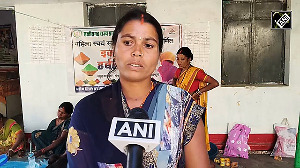The speaker of the Kuwaiti parliament has said that his country will seal its border with Iraq to prevent refugees from coming in.
Speaker Jassem Al Khorafi ranks third in precedence in his country after the Emir and the Crown Prince.
War with Iraq is not inevitable, he said, adding that internal changes within Iraq will make any conflict unnecessary.
Jassem Al Khorafi told rediff.com: "No refugees will be allowed to come in because Kuwait is a very small country and we cannot risk a large inflow of civilians and infiltrators. We don't know what their origin is."
Kuwaiti authorities are worried that Iraqi fifth columnists disguised as refugees may try to destabilise the country.
While there is no evidence that Iraqi agents are intent on stirring up trouble, Islamic extremists operating within Kuwait have attacked US soldiers and civilians in the recent past.
They are believed to be part of a group of more than 150 so-called Kuwaiti-Afghans, who fought against the erstwhile Soviet Union in Afghanistan.
Khorafi described them as a 'small community'. "We are not against those who went to Afghanistan. We are against those who take action in Kuwait, which is against our legal system."
At least one Kuwaiti-Afghan is believed to be involved in an attack on Americans in January.
Sami Al Mutairi confessed to shooting dead Michael Rene Pouliot and wounding David Caraway. The two civilians were working at the US military base of Camp Doha, north of Kuwait City.
Kuwaiti security sources told rediff.com that during interrogation Mutairi had said that he had 'embraced' the philosophy of Al Qaeda.
Last November Kuwaiti policeman Khalid Al Shimmeri had shot and wounded two US soldiers after stopping them on a highway south of the capital.
He had told interrogators that he hated Americans and wanted to kill them.
In October two Kuwaiti gunmen killed a US marine and wounded another during war games on a Kuwaiti island.
Meanwhile, Kuwait's Minister of Interior, Sheikh Mohammed Khaled Al Sabah, has announced that extra security personnel will be deployed from Saturday.
He said Special Forces personnel would be deployed along the country's main roads until further notice.
They are among 4,000 officers who have been authorised to use weapons without prior authorisation.
Surveillance cameras are being deployed along the roads used by US convoys, he said. But the government has no intention of declaring martial law, including night-time curfews.
The interior ministry, in a statement, said, "Kuwaitis and expatriates should carry at all times either their original civil id or passport due to the current circumstances in the country, which call for tightening security measures."






 © 2025
© 2025